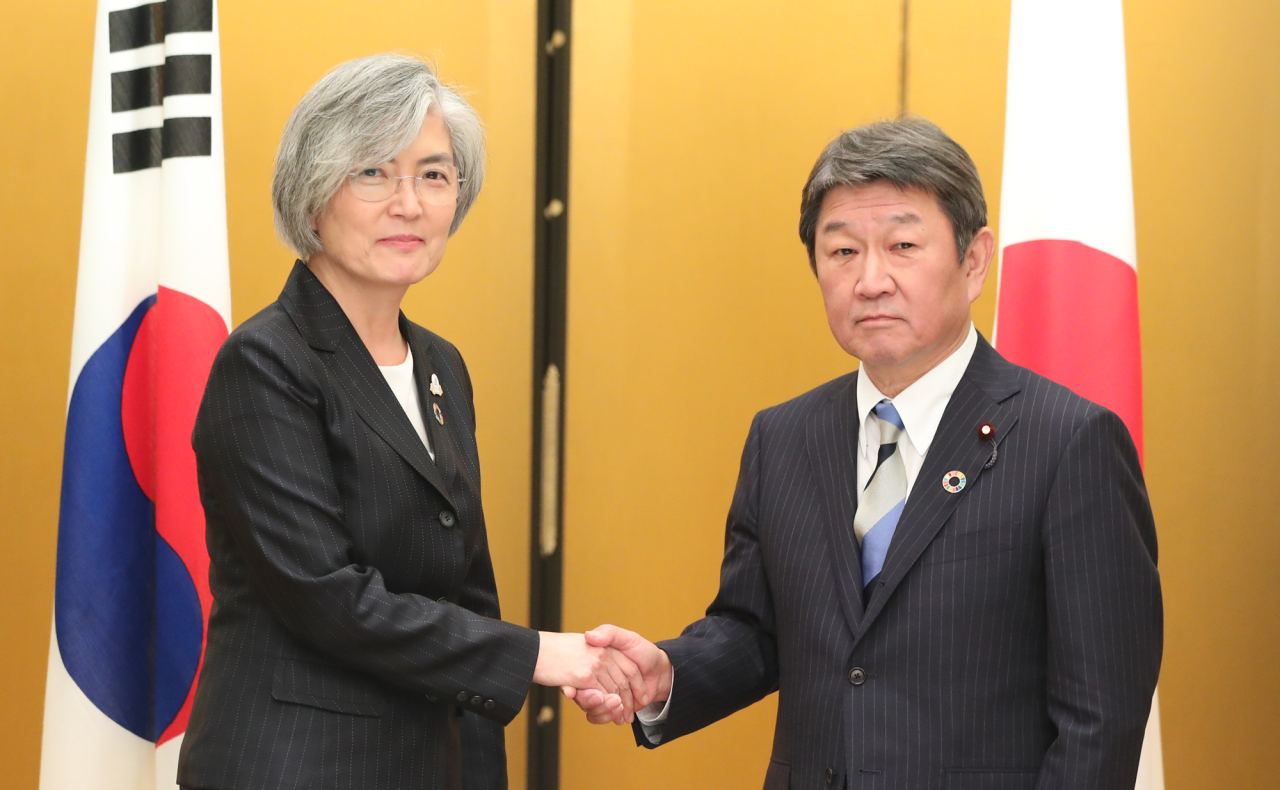Hopes are rising that Seoul and Tokyo could be heading toward resolving their ongoing spat, with the two sides agreeing to arrange a bilateral summit.
The agreement was reached at the meeting between Seoul’s Minister of Foreign Affairs Kang Kyung-wha and her Japanese counterpart Toshimitsu Motegi on the sidelines of the G-20 foreign ministers meeting in Nagoya, Japan, on Saturday.
According to the two countries’ foreign ministries, they will work together to arrange a summit between President Moon Jae-in and Japanese Prime Minister Shinzo Abe on the sidelines of the Korea-China-Japan trilateral summit scheduled to be held in Chengdu in China’s Sichuan province next month.
 |
Foreign Affairs Kang Kyung-wha (left) and her Japanese counterpart Toshimitsu Motegi (right). Yonhap |
Relations between Seoul and Tokyo have been on a rapid decline after Japan introduced trade-curbing measures in retaliation against the Korean Supreme Court’s ruling in favor of those forced into working for Japanese firms in the first half of the 20th century.
Seoul responded by announcing that it would not renew the General Security of Military Information Agreement with Japan.
The two sides, however, reached an agreement hours before GSOMIA was set to expire at midnight Friday. Seoul and Tokyo announced the decision at 6 p.m. Friday, only six hours before the military agreement was set to become null.
Under the agreement, Seoul postponed the end of GSOMIA on the condition that the two sides engage in talks that Seoul hopes will lead to the withdrawal of Japan’s trade measures.
Korea said that the expiration of GSOMIA has been postponed and that the agreement will expire if talks do not produce acceptable results.
After her meeting with the Japanese foreign minister, Kang told reporters that the two sides “positively assess” the beginning of talks between the two countries’ trade authorities and that she had made clear Seoul’s position that Japan’s trade curbs must be withdrawn through the talks.
However, tough negotiations are likely to be in store, with the two sides having different stances toward the forced labor issue.
According Seoul officials, Kang and Motegi have reaffirmed their countries’ positions on the issue. Tokyo says that compensation for forced labor victims was settled by the 1965 treaty that normalized relations. Seoul, in contrast, maintains that the treaty did not nullify individuals’ rights to seek compensation.
In addition, Motegi is reported to have warned that Seoul-Tokyo relations may deteriorate further if the Korean court liquidates seized Japanese assets.
By Choi He-suk (
cheesuk@heraldcorp.com)




![[Herald Interview] 'Trump will use tariffs as first line of defense for American manufacturing'](http://res.heraldm.com/phpwas/restmb_idxmake.php?idx=644&simg=/content/image/2024/11/26/20241126050017_0.jpg)


![[Herald Review] 'Gangnam B-Side' combines social realism with masterful suspense, performance](http://res.heraldm.com/phpwas/restmb_idxmake.php?idx=644&simg=/content/image/2024/11/25/20241125050072_0.jpg)
![[Health and care] Getting cancer young: Why cancer isn’t just an older person’s battle](http://res.heraldm.com/phpwas/restmb_idxmake.php?idx=644&simg=/content/image/2024/11/26/20241126050043_0.jpg)